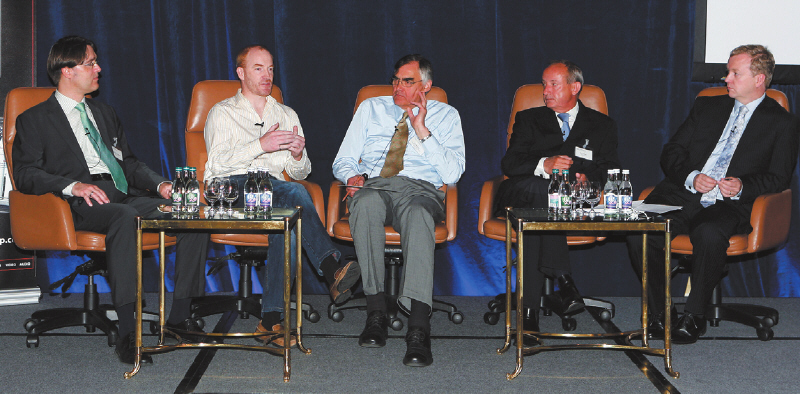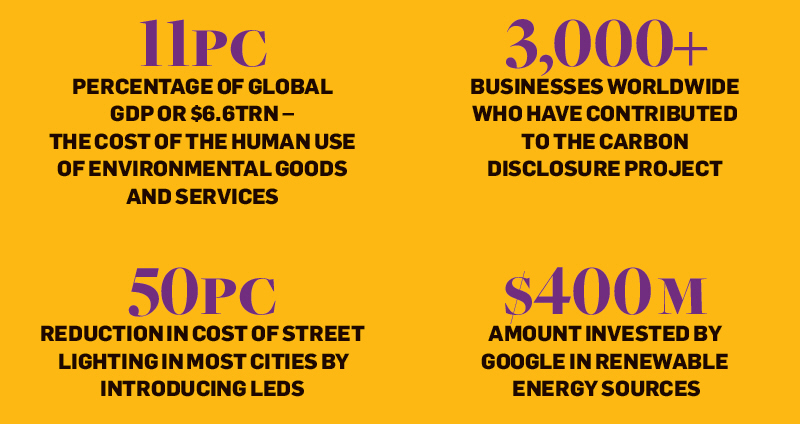International experts urge multi-party consensus on tackling climate change, as businesses and investors realise this is the path to recovery.
It is already becoming clear that, despite technology advances and increased awareness, our planet is unlikely to prevent temperature rises of more than 2°C, the threshold for potentially dangerous climate change. Scientists paint a bleak picture of food, fuel and water shortages in the decades ahead.
On Tuesday, former United Nations climate-change chief Yvo de Boer, now global adviser on sustainability at KPMG, offered a packed Green Economy conference in Dublin evidence of a prelude to what’s to come. He said that Japanese farmers are complaining that China is no longer putting chemical fertiliser on the market because they need it themselves. Meanwhile, the Pentagon is concerned that certain metals are now only available in some Asian markets.
Ask any Irish person today what is the single greatest issue facing the country and the answer would probably be: the economy. But, beyond our economic issues, a bigger climate-change battle looms and most countries have yet to come up with solutions.
Environmental experts at The Green Economy Business & Leadership Briefing in Dublin this week called on Irish Government leaders and the leaders of all political parties to form a consensus on how Ireland is to deal with the climate change issue. Ireland’s very response to climate change and the provision of renewable energy could in many ways lead to the country’s economic salvation, they said.
Dick Budden, director of the Carbon Disclosure Project (CDP) in Ireland, said that from what he can see, the economy is distracting governments around the world from this issue.
“Regulators, like generals, focus on fighting the last war but don’t see the next one coming,” he said.
“The broad set of challenges we face over the next 100 years is plain,” said Budden. “The issue is not whether we know what the future holds but whether we have the collective will and institutions capable of taking tough decisions. The financial crisis of 2007 is the perfect case study: political leaders failed to heed the warnings. As the world turns faster, politics always slows the politicians’ responses.”
He said he felt the UN’s Copenhagen climate-change conference in 2009 failed to make an impact on governments. “Step up to the plate enlightened capitalists,” Budden urged, pointing out that principled investors get it.
He said that institutional investors are taking action while governments still struggle to deal with unfamiliar future threats. “The stock values of leaders in the CDP process are outperforming the market.”
In his keynote speech, de Boer said the issue of governments putting the environment on the back burner is a global one, not just an Irish one. He joked: “But can we put the world on hold while we save the Irish economy?”
An example set
Illustrating the international situation, de Boer said US President Barack Obama decided to prioritise healthcare over green and that sends a message to other countries. “If Obama won’t do it, then maybe China won’t do it.
“So is it stuck from a political point of view? Since the Copenhagen conference, all 42 industrialised countries have put emission reduction targets on the table and are writing legislation. That still won’t save us from a two-degree temperature increase. It’s not good enough, but it is significant.”
Globally, de Boer said more than 80 countries, including China, have committed to targets to reduce emissions or have action plans. “All of these countries account for 85pc of global energy-related CO2 emissions.
“While I would agree the politics of climate change are stuck, there is action happening at a national level.”
In terms of the trends around the world that businesses and countries are concerned about – energy prices, materials scarcity and population growth – inevitably we are being forced to become wiser in terms of how we use energy and natural resources in our economy. And de Boer says some economies have taken a radical step forward.
“China used a significant part of its economic recovery package to drive a fundamental change in its economy, investing in solar and wind for instance. This was driven by a fundamental realisation that you can’t grow the Chinese economy the way it’s being driven at the moment.
“Korea was more extreme. It used 80pc of its recovery package to drive that change. It is being forced through and embraced by the business community.”
But what does this mean for Ireland? “There’s an opportunity in this. If I ask businesspeople what do they cry out for the most, the answer nine times out of 10 is predictability.
“There is a unique opportunity for Ireland to develop a multi-party strategy and vision to give businesses that long-term predictability. Is this not an opportunity to craft that agenda in partnership with businesses, knowledge institutions and civil society?”

Pictured at the The Green Economy event were Willfried Weinholt, Siemens; Tom Raftery,
GreenMonk; Dick Budden, CDP in Ireland, Yvo de Boer, KPMG; and broadcaster Matt Cooper
As well as governments, sustainability is becoming a major issue for cities, Dr Willfried Wienholt, vice-president of Urban Development at Siemens, explained.
“In a nutshell, cities are growth engines in the economy, contributing 40 to 50pc of GDP. Since cities are also the big contributor to climate change, how do we help them to cope with that? If the city is really an economic driver, governments need to ask themselves ‘What do I need to do from a decision making point of view?”
Wienholt said cities are already competing for investment and people to live in them.
“Decision makers are trying to balance and take care of how to get financed and drive cities as a business. But where are the KPIs? What does it cost and what’s the return on investment? If I want to reduce my carbon footprint by 10pc, how much does it cost? What is feasible?
“To win investment and win people, governments need to be more precise.”
Such precision is also vital in helping businesses to see how they are helping the environment, said Tom Raftery, principal analyst with GreenMonk and co-founder of the CiX green data centre in Cork.
He said that, at present, businesses are being urged to embrace cloud computing as a way to be more energy efficient. However, major cloud computing providers’ inability to provide real energy utilisation figures to prove cloud computing is more efficient is only adding to people’s doubts about the technology movement.
Referring to Facebook’s new data centre in Oregon, Raftery pointed to its impressive PUE (power usage effectiveness) of 1.07. “But Facebook uses PacifiCorp, which gets 63pc of its energy from burning coal.”
He also pointed to Microsoft’s Dublin data centre, which has a PUE of 1.25. “But it is based on the Irish grid, where 87.5pc of energy comes from fossil fuels.
“And $400m is how much Google has invested in renewable energy,” he said, looking at the internet giant’s purchase of solar farms in the Mojave Desert and wind farms in Iowa and Oklahoma to power its data centres.
“Wouldn’t it be great if Google set up wind farms off Ireland’s coast to power its European data centres?” posed Raftery.
Photo, top right: Global adviser on sustainability at KPMG and former United Nations climate-change chief Yvo de Boer
